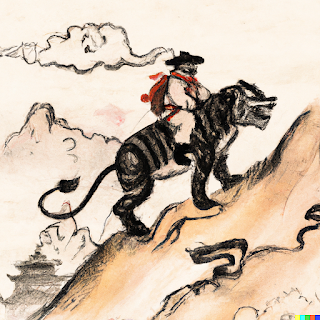Growing your Tree of Prosperity is an introductory investment guide written specifically for Singaporeans who wish to take their first step towards financial independence.
Saturday, December 31, 2022
2023 is the year I hope for the best
Friday, December 30, 2022
Who does ChatGPT actually disrupt?
Tuesday, December 27, 2022
Inflation and the Chemical Castration of Singaporean Men
I was really tickled pink when I read this hilarious article about the latest dating trends on Today Online.
You can access the link here: https://www.todayonline.com/singapore/young-singles-putting-themselves-first-when-dating-more-open-cheaper-dates-surveys-2079916
I don't have an issue with more straightforward and cheaper dates. That's bad for business, but simple dates force everyone to focus on basic communication skills, which can't be bad given how transactional relationships are these days with dating platforms.
What I don't understand is young guys prioritising their mental well-being. In the article mentioned, this dude got ghosted and took a step back from the dating world due to being ignored over a chat app.
I don't ghost people during my time, but I had plenty of dates that did not meet my expectations in the looks department, so I refused future dates. After 2-3 tries, folks get the hint and move on.
But I had my fair share of nasty rejections too.
I was matchmade to a Citi banker who deliberately came late for a movie date, forced me to buy earlier session tickets, and then claimed that she was in a bad mood because her options were out of the money.
But I did not focus on my mental wellness after that disastrous outing. I did the opposite. I "scienced the shit" out of dating and created a "system" - if I can meet ten women in a foreign language class and attend six different classes a year, then that means 60 potential mates. When I felt that, as an Asian guy, I didn't meet the expectations of women who studied French, so I learned French and Japanese simultaneously, thereby increasing my potential catch to 120, eventually meeting my wife in Japanese class. I wonder what my life would have been like if I had studied German too.
Naturally, I'm not so willing to conclude that guys need to protect their mental wellness from women ghosting them on chat platforms.
Rising inflation has led to lower purchasing power for young men. Furthermore, as Tech begins its round of reductions, I expect guys who studied Engineering and Computer Science to bear the brunt of the latest corporate restructuring exercises. Also, the crypto crash hurt the bottom line of many crypto bros. But there is a bright side - Many women have been spared from having dates who can't stop talking about the shitcoins they own.
Our Madam President initiated a recent discussion that we're too lenient with men above 50s because they can avoid caning as a punishment. Consequently, many citizens think that instead of caning, we should chemically castrate these sexual predators. Chemical castration is temporary, less painful for men, and can help them control their sexual urges.
Maybe it is sad and somewhat ironic that we're discussing how to chemically castrate middle-aged men while younger guys are getting "economically castrated" by the downturn in Singapore.
Hopefully, 2023 will see better days after Q3. A prolonged period will swell the ranks of the BBFA, and future tax-payers like my children will have to support these defeated guys in their old age.
Saturday, December 24, 2022
Merry Christmas and Happy Holidays - Personal thoughts as I turn 48 !
Thursday, December 22, 2022
Who do you want to be?
Lately, I’ve started to think like a working person again, and one of the things I like to think about at work is whether I’d like to have the kind of lifestyle of someone more senior than me. This is an excellent way to think about company culture and whether it is worth climbing the ladder in your organisation.
Sadly, the only time I’ve felt that I wanted my supervisor’s life was when I was in P&G because it cultivated a dynamic and fun working environment where managers did not have to sacrifice their personal lives to get ahead at work.
P&G managers were cool people, and they had a great family life.
After that, with almost everyone I met in subsequent work engagements, I found myself unimpressed with the quality of their lifestyles. One possible reason why I was not inspired was possible because I finally managed to figure out how FIRE worked. By then, I was almost financially independent when I was outsourced to HP.
While I did not envy my bosses after leaving HP, I was still ok working at my various IT roles because the money would eventually pay for a financially independent lifestyle. It was only when I left the private sector that I finally saw the kind of bureaucrats that ran the elitist, toxic workplaces in some statutory boards, which made me realise what kind of manager I do not wish to become.
By this time, my finances could financially support my family, and I knew that I no longer needed a role model. I’m proud to say that seniors from some organisations I worked for have attended my programme. If anything, I expect managers to read about me and aspire towards my kind of financial independence.
Of late, as I am on OJT with a boutique law firm, I’m starting to see some lifestyles which I’m beginning to envy again (but in a good way). These folks I meet are senior lawyers in their 70s, who have spent a lifetime in service, and run their practice.
In the grander scheme of things, my new role models are comfortable financially but not the wealthiest folks in the legal sector. They are exceptionally confident and have great stories to tell about their most significant legal victories in the past (and very famous clientele). They have a lot of autonomy and have been downshifting their workload towards less stressful engagements. They are also doting grandparents who give high priority to their families.
Also, what impresses me is just how sharp and witty these seniors are when many peers in their generation are trying to stay alive or not fall into dementia. Almost every coffee session with them is a fun experience (because they have no filters).
I’m unsure whether I will survive the next 1-2 years in this sector for a mid-career guy like me. My career runway may be too short of reaching the halfway mark to this stage, but I think I will benefit greatly from having front-row seats to seeing such successful ageing in practice.
Here is what I have learnt so far :
- Cut down on sugar, salt and food portions as you grow older.
- Don’t smoke and don’t drink. ( Kinda hard for lawyers )
- Cultivate relationships, not just within the family, but have a bunch of kakis about the same age to drink coffee with you.
- Bonus points if your kakis are hilarious and optimistic. The substance of legal work can be very negative.
- Do some work to give yourself the excuse to get to the office and interact with fellow human beings.
- Work on something mentally engaging and interesting but not stressful.
[ You might find that my writing is not as good as I’m posting this on an iPad and can’t get Grammarly to work with Chrome. ]
Sunday, December 18, 2022
Monetizing the Loneliness Epidemic
I was greeted with silence.
This is not the only time I witnessed young people making it clear that they are not ready to pair up. Earlier this week, another young professional said, with quite firm conviction, that marriage is out of the question.
It's one thing to argue that the economy is not doing well, so folks are not putting pairing up and marriage as the number one priority. It is another when singlehood becomes so compelling when guys who are highly educated, highly paid, and flexibly religious refuse to settle down. For one thing, it leaves women with a weaker gene pool - they may settle and compromise on these three significant conditions.
Women, in response, will also choose to remain single because they are even choosier than men. If the only guys available on Tinder are deadbeats, why even bother?
What does this all mean?
The next epidemic may be one of loneliness.
The case of Yang Yin is instructive. He was a tour guide who befriended a wealthy childless widow hoping to inherit her money. Sometimes, because we catch one Yang Yin, how many Yang Yins get away with inheriting money from lonely people in Singapore?
But on the other hand, we can't argue that folks like Yang Yin do not perform a proper function - they help the elderly cope with loneliness.
With a sheer number of lonely singles in one of the wealthiest countries in the world in the future, it's probably more ethical for a legitimate business to arise to monetise the loneliness of singles. A company can properly deploy befrienders and social workers to keep wealthy seniors company, run errands for them for a small monthly fee and a promise to let the firm inherit all their wealth after they pass on. The firm should be audited by another third party to ensure that the interests of the lonely seniors are not compromised.
Having a private company perform this befriender service for a fee for wealthy but lonely seniors would allow the public sector to find some tax-payer subsidised solution for the more significant population.
Friday, December 16, 2022
Singapore's strange happiness conundrum
I was just settling down for the weekend and recommend this book called Blind Spot by Jon Clifton, who is the CEO of the Gallup poll. The book is chock full of interesting statistics and has a dedicated chapter on Singapore.
The Singapore Happiness conundrum is right up to 2011. Singaporeans began to experience a reduction in both happy and unhappy experiences. This is puzzling because it is difficult to see whether society is becoming happier or more prosperous or whether things are falling apart.
Gallup really struggled with explaining this phenomenon because Singapore is unique. The only surface interpretation is that we're all becoming more stoic and consider emotions a liability.
Interestingly, the number of positive experiences after 2011 began to bounce up. Still, Gallup cannot attribute it to stronger labour relations or even folks catching onto the survey. The book reports many folks claiming to even understand what the study is about, which shows how well-read Singaporeans are.
For me, a glaring omission was the PAP lost its first GRC in 2011, and a slew of reforms was made to appease the populace. I remember IPPT standards being reviewed to make RT less onerous for NSmen and NS being reduced to 2 years for A-level and Poly graduates. I remember Singapore becoming much easier to live in after that watershed election.
Will the gap between positive experiences and negative experiences improve as we move into 2023 and become more left-leaning as we see higher GST and property taxes?
Time will tell, but I hope we don't sacrifice future generations just to keep Millenials and Gen Z happy.






